I have an issue with people who lump the Eurovision Song Contest into the ‘reality TV show’ bandwagon. The Song Contest was around long before the current fashionable trainwreck of reality TV exploded at the end of the twentieth century. Before then shows like ‘Opportunity Knocks’ and ‘New Faces’ in the UK brought an element of competition with real people to the screens, but not to extent we have now, and certainly not with the manipulation you see every Saturday night.
While there are reality elements that seem to appear in Eurovision, let’s be clear. Our Song Contest is as far removed from the world of Strictly Come Dancing or The X-Factor as it can possibly be.
First up, and perhaps paradoxically, the Eurovision Song Contest is probably closer to reality than a reality show. There is no focus on telling the life story of the performer on stage. What you see is what you get, with very little polish or manipulation by shady backroom deals. Sweden may be looking to introduce the artists in the thirty second postcards for the 2013 Contest, but I’m expecting to see the return of a lot of soft-focus shots of them exploring Malmo and Sweden, as opposed to finding tragedy in their life and how the Song Contest is the one way they can overcome this.
Artists can go out and do the PR circuit to promote their song by appearing on breakfast TV sofas around the continent, and their staff hand out funny shaped USB keys and promotional CD’s in the Eurovision Press Centre… but the majority of people watching Eurovision around the continent will be seeing these acts and hearing their song for the very first time during the live final. The audience will come to the songs with little or no preconceptions handed to them by a production team or influenced by the marketing.
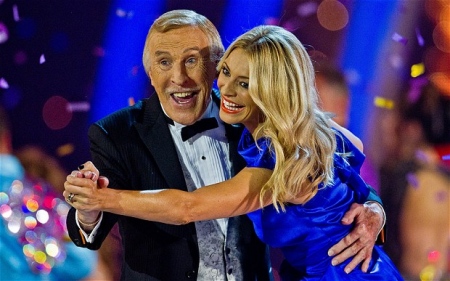
Bruce Forsythe and Tess Daley: Strictly Come Dancing (BBC TV)
In some circumstances there may be an interesting back story that a reality show would be expected to leverage, Sjonni’s Friends for Iceland in 2011 being a prime case here. The only way that viewers of the final would pick this up is if their national commentator slipped it in during the short break between songs… and even then they have to do the outro from the previous songs, potentially mention the voting lines and the conditions attached to the premium rate call, throw out one or two bits of Twitter feedback, and intro the next song.
That doesn’t leave much time to pluck the heart strings, and in any case most commentators exhibit a strong sense of fair play during Eurovision. Yes they’ll be partisan over their own country, but seeing as you can’t vote for your own country that’s not going to come into play.
Do We Know Better Than You?
Let’s think about the difference between the Eurovision juries and those on a show like the X-Factor. On the latter show, once a song is over and the viewers are forming their own reaction, the reality show will present three or four judges who have been heavily promoted as ‘knowing what works’ giving their advice and critiquing the singer.
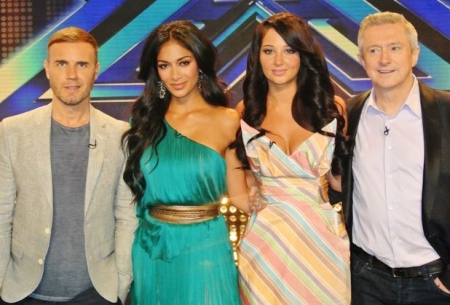
The X-Factor Judges for 2012 (ITV)
Everyone loves a winner, and people want to follow a crowd, both in real life and when voting. So it’s a simple matter here for the judges to have a hugely unbalancing effect on the result of the show with just a few cutting words (“I didn’t like it”) or voluminous praise (“I’ve worked with Carly Simon on that song, and frankly you just sung it better than she ever could. If people don’t vote for you then there’s no justice”).
Contrast this to the hidden jury members at our Song Contest. Their names are not revealed until after they have voted, and they have zero interaction with the public. The jury and the public votes will be aggregated together, but the first time the two sides meet is when their votes are added together by the adjudicator to get the combined score during the interval act.
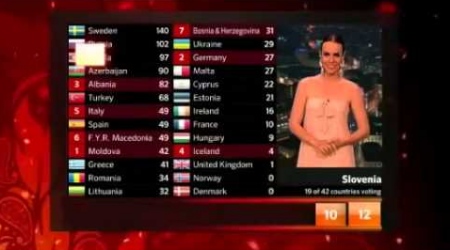
Who’s got douze?
Camera One, Camera Two, Camera One, Camera Two.
Moving away from the singing based reality shows, the ‘soft scripted’ reality shows are even further away from Eurovision. I’m thinking of shows like ‘The Real Backing Singers Of Detroit‘ (and if Bravo haven’t commissioned that, it’s sure to be along in the 2013 line-up). Shows where a team of script-writers decide on the plot lines and character acts before the cameras roll; the situations that the characters need to appear in; and of course deciding when the time is right for someone to leave the show.
Couple that with judicious and careful editing of a few days into a 25-minute program and it’s as far removed from reality as possible…yet it’s called “reality television”.
Where’s the space for that at Eurovision? The simple answer is there isn’t – everyone gets three minutes of live television around the continent with no retakes (Jimmy Jump willing). Strictly speaking, the TV director could influence the outcome with a judicious choice of camera angles, and there have been stories of rather… forceful discussions after the rehearsals between delegations and directors. But when the live shows come around, the shot list is fixed and agreed upon by all.
The heavy editing to favour one contestant over another, typical of reality shows when the public are voting for a winner, is simply not present at the Song Contest. The TV directors are doing it live and don’t have the luxury of twenty four hours of footage to go through for that night’s highlights. They’re focused on little more than managing to air the best live show possible.
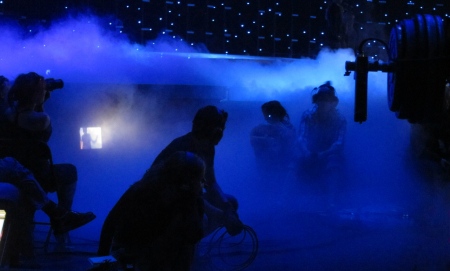
Backstage at Oslo 2010 (Ewan Spence)
The Running Order… Fate Or Fixed?
How much scripting goes into a reality show is always open to discussion, and drives countless forum posts. On performance based reality shows such as Strictly Come Dancing and especially The X-Factor, the running order has a huge influence over the potential success of an act.
The same is true of Eurovision, and we have just as much debate on the running order and how this makes or breaks a song’s chance at the Contest. Look at the power that “running second” has built up over the years; how Engelbert Humperdinck’s chance of victory was snuffed out in March when he drew the opening slot for the Final in May; and how Spain’s wildcard selection is always the running order of last year’s winning song… if they get the wildcard this year, I’ll put good money down they’ll choose to sing seventeenth.
Apart from one wildcard country in each semi-final and final who can decide where they want to sing, the draw is a random occurrence One of the main weapons of manipulation of the reality TV show is simply not available to the Eurovision Song Contest hierarchy. Okay, your conspiracy theories about rigged draws, hot balls, rough surfaces, etc, can go in here. Knock yourself out in the comments with your best theory.
Let’s not get into to much discussion around the Junior Eurovision draw where there are three wildcard selections and the running order of the other nine performers are ‘announced’ after the draw, and what that means to the spirit of open and fair competition.
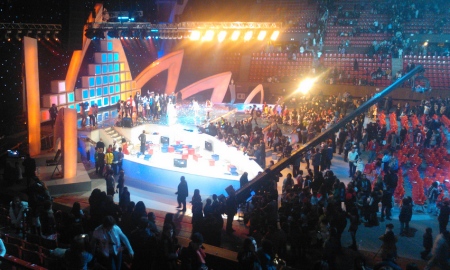
The end of Junior Eurovision 2011
Hello Europe, This Is Fairness Calling…
Looking closely at the Eurovision Song Contest, the EBU have went out of their way to create a level playing field for the annual contest. Decisions that could have a material impact on the Contest are discussed extensively in committee, and the Contest is organised to minimise their effect. Where this is not possible (such as the running order) a random element is substituted.
Yes, there are a number of national finals around the continent that rely more on the tropes and structure of a reality show, and we’ll be looking at them through the upcoming season, but our big annual get together is as fair as possible.
The Eurovision Song Contest is not a reality show.
It is, simply, reality.









Totally agree Ewan – Eurovision is NOT a reality show at all. In fact, many critics would probably say it doesnt reflect the reality of mainstream musical tastes in any way – although the wide success of this years winning song might perhaps suggest otherwise. And it certainly seems ‘unreal’ if you are in the Eurovision bubble!
And with regard to Junior Eurovision, the EBU actually changed the rules to move away from a reality show with totally inexperienced kids who had written a song to a show with children from stage schools, music academies and some already experienced at doing TV shows of their own. In a couple of weeks, we’ve even got an artist who could now be described as a Junior Eurovision ‘veteran’.
Note: I must qualify this comment about reality by saying that Mr Terry Vision IS, of course, entirely real!
Outrageous. There is no reality TV here. It is outrageous that the Eurovision Song Contest, institution of 50+ years, is lumped with the half naked imbeciles of Big Brother.
As always Mr Spence, a fine article as always.
Very well put together piece, perhaps you could forward the last two bits to Mr. Sand and Friends, c/o European Broadcasting Union?
Ewan, you’ll know when the British public starts calling the Eurovision Song Contest as another reality TV show when they all start screaming, “IT’S FIXED!”.